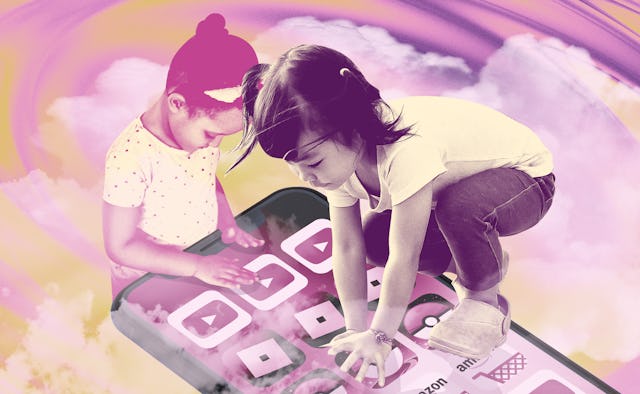These Apps And Games Are Collecting The Most Data From Your Kids
And this is what companies are doing with it.

Whatever you think about screen time, it’s likely that your kids get some. Whether they’re on a phone, tablet, or computer, you might worry about whether social media is affecting their mental health, or if they’re consuming inappropriate material. But here’s one more thing you should consider: how much data the screen time is collecting from your kid.
And not all apps are created equal when it comes to taking information from your kid.
A recent analysis by The ToyZone examined the app permissions (you know, the fine print you probably don’t read but check the box to accepted) for a bunch of popular apps kids use. They found a great deal of variety in how much and which kinds of data these apps are collecting, and it’s important to know so you can better control how much of your kids’ data is being collected by monitoring or limiting which apps they’re using.
It’s worth noting that some of the biggest names — Pokémon Go, Roblox, YouTube, Amazon, Facebook — were also the biggest offenders when it came to data collection.
Here’s what you need to know.
What data are kids’ apps collecting, and why?
Every time you, or your kids, go online, companies collect data: location, personal information, purchases, and even financial info. Companies then use this data for marketing purposes, mostly for targeted advertising. This explains why your screens are suddenly full of advertisements for appliances after you googled dishwashers that one time.
Other data that TheToyZone found kids’ apps collecting included: browsing history, purchases, usage data, contacts, and even search history.
“It’s difficult to put a monetary value on what this data is worth,” says Daniel Booth, content producer and toy reviewer at TheToyZone. “Let’s just say that it is extremely valuable for these companies.
Which kids’ apps collect the most data?
TheToyZone divided up the apps they reviewed into different categories and found some interesting patterns. Money management apps, like Greenlight, the worst offender of them all, collected the most data. Games and social messaging apps were also big trackers. At the other end of the spectrum were apps categorized as ‘science’ or ‘nature and animals,’ which collected the least data.
But within these categories there was also a lot of variation. Greenlight, for example, which tracks kids’ money use, collected 22 types of data, while competitor Jassby only collected one type (identifiers). In gaming, Pokemon Go was the top offender, collecting 17 types of data. You definitely need to know someone’s location to show them available Pokémon, but health and fitness? Does the company need to know your kid’s daily step total?
Other big data collectors in the gaming category include crowd favorite Roblox and Animal Jam. There was one game, Townscaper, which allows you to architecturally populate imaginary towns on the water, that notably collected zero data.
Apps like Townscaper, unfortunately, were few and far between. Only 17 of the 107 apps surveyed collected no data.
Why you should care
It isn’t as though you don’t have a lot of other worries, even counting only the ones that involve little screens and your kids. How big a deal is this, and why should you care if companies have your kids data?
“As they grow up, their likes and interests will be tracked and targeted online,” Booth tells Scary Mommy, “which means that they could be manipulated into buying or wanting products that have been selected for them.”
There are other reasons to encourage your kids to try to preserve their anonymity online.
“Unfortunately it’s not just tech companies that can take advantage of a child’s naivety,” Booth explains. “Hackers and other criminals can access [data] to steal, defame, and otherwise harm children.”
What you can do
The good news for parents? Knowledge is power. Now you know which apps are the worst offenders. In some cases, it’s possible to switch to another, less data-hungry app. You might be able to convince a child to use EdModo or Girl2Girl Wall for social messaging, for example, rather than the more invasive Facebook Messenger and Instagram.
As with so many things in the world of parenting — particularly things digital — it’s about balance. There are real, non-nefarious reasons that apps collect your data.
“If popular apps stopped collecting data, the companies that run them would have much less information about their users,” says Booth. “This means it would be more difficult for apps to get access to fixing bugs and how people use their service.”
But there are also good reasons for kids to protect their data. TheToyZone suggests only downloading apps from reputable stores, applying strict privacy settings, and using parental controls if they’re available.
More importantly, Booth recommends engaging kids in conversations “about their personal privacy — what they say and do online — and their consumer privacy — the data they grant to software companies.” Kids should understand that their data has value, just like money.
Zero data collection sounds like a laudable goal, but it’s probably not at all realistic, depending on what your kids are using their phone to do. Use this information as an opportunity to sit down with your kid, go through their phone or tablet with them and, depending on their age, have an honest and open conversation. What are the data guzzlers, and do they have less-data-hungry equivalents? It’s never too early to teach our little digital spawn how to protect their privacy online.
This article was originally published on